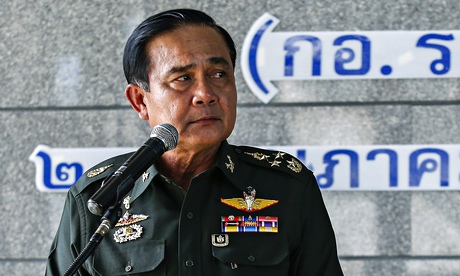Thailand's ruling junta approves China rail links worth $23bn
Transport project further consolidates China's power in the region and will be finished by by 2021
Thailand's ruling junta has approved a $23 billion (£13.6bn) transport project that will see two high-speed railways link up directly with China by 2021, in a move seen as a further consolidation of Chinese power in the region.
The National Council for Peace and Order (NCPO), headed by Gen Prayuth Chan-ocha - who took control of Thailand in a bloodless military coup in May - unveiled plans this week connecting the northern border town of Nong Khai with Map Ta Phut, located south-east of Bangkok. Chaing Khong, just south of the Laos capital Vientiane, will also be connected to Ban Phachi, in the central Ayutthaya regions.
The railway lines will link up directly to Kunming, in China's southern Yunnan province, in what analysts have termed Chinese "high-speed railway diplomacy".
China is looking to build a 3,000km (1,860m) high-speed line from Kunming all the way down to Singapore, passing through Laos, Thailand and Malaysia — a project that would increase China's GDP and those of the involved nations by $375b, a former Chinese railway chairman told the China Daily.
According to China Railway Corp, it appears the Kunming-Singapore line will be constructed in four stages, from Kunming to Vientiane, Vientiane to Bangkok, Bangkok to Kuala Lumpur, and Kuala Lumpur to Singapore. Construction of the Thai lines is planned to begin next year as part of the new eight-year 741.4 billion baht ($23.3bn) infrastructure development project connecting Bangkok and other key cities with airports, seaports, border areas and cargo depots, the Bangkok Post reported, with some 106 new trains added to the existing fleet. Six dual-track railway lines will also be constructed under the same scheme.
The two routes comprise nearly 1,400km in total but unlike many other high-speed trains, which generally run at a speed of 200 km per hour, will only be able to run at 160 km per hour until further investment would allow a higher-speed system.
Chinese officials involved in the project have described the deal as a major scoop for the Chinese government, which had earlier struck a deal with former prime minister Yingluck Shinawatra — only to see the project initially rejected by the junta when it came to power.
Now the military government has approved the project, "there will be huge room for cooperation [between China and Thailand]," Yang Yong of the China Railway Corp told China Daily, adding that Chinese engineers had been involved in feasibility research for the high-speed lines, and Chinese companies were directly helping to modernise Thailand's railway system.
The effect of high-speed rail is likely to change South-east Asia and the way it does business for good, says Geoff Wade of the College of Asia and the Pacific at the Australian National University.
"When the people of the mainland countries soon find, through the convenience of [high-speed railways], that Kunming is their 'closest neighbour' but a few hours away, the Yunnan capital will gradually emerge as the hub of the Greater Mekong Region and will eventually become, in effect, the capital of mainland Southeast Asia," Wade wrote on the Australian Strategic Policy Institute Blog.

